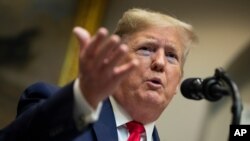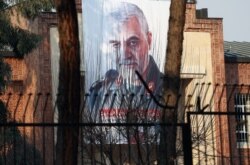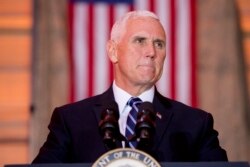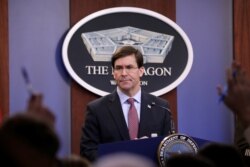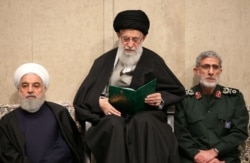U.S. President Donald Trump said Thursday that Qassem Soleimani, the Iranian general that he ordered killed with a drone strike, had been planning to blow up the U.S. Embassy in Baghdad.
Trump and his aides have drawn sharp criticism from opposition Democratic lawmakers and some Republicans for refusing to disclose what they say was the "imminent threat" that Soleimani posed at the time he was killed in the car he was riding in at the airport in the Iraqi capital last week.
But Trump, speaking at the White House, offhandedly remarked, "We did it because they were looking to blow up our embassy. We also did it for other reasons that were very obvious. Somebody died, one of our military people died. People were badly wounded just a week before."
Trump administration officials had previously blamed Soleimani, the commander of Iran's Revolutionary Guard Corp's Quds Force, for killing American armed forces and the U.S. contractor Trump referenced, while fomenting unrest in Iraq and Lebanon. But they had balked at disclosing specific reasons for the killing of Soleimani. After background briefings this week, some lawmakers complained that evidence of an "imminent threat" posed by Soleimani was scant.
A senior U.S. Defense official said that when Trump was presented with options regarding Iranian threats, other proposals besides killing Soleimani would have involved the possibility of far more casualties.
Trump's remarks came as U.S. officials say they believe Iran intended to kill American forces with its ballistic missile attacks on bases in Iraq early Wednesday as retribution for the drone attack on Soleimani. Their assessment followed Trump's Wednesday White House address in which he said new economic sanctions would be imposed on Tehran, while concluding that Iran "appears to be standing down" from new conflict with the U.S.
"The ballistic missiles fired at American bases … we believe were intended to kill Americans," Vice President Mike Pence told the NBC news network Thursday. "We have intelligence to support that was the intention of the Iranians."
Pence's assessment echoed comments Wednesday from the top U.S. military leader, Joint Chiefs Chairman Gen. Mark Milley, who told reporters at the Pentagon, "The points of impact were close enough to personnel and equipment and so on and so forth. I believe, based on what I saw and what I know, is that they were intended to cause structural damage, destroy vehicles and equipment and aircraft, and to kill personnel."
No U.S. forces were injured by the 16 short-range ballistic missiles fired from three sites inside Iran, targeting two military bases in Iraq where U.S. armed forces are stationed. But Milley said, the absence of casualties "has more to do with the defensive techniques our forces used than it does with intent." The senior Defense official said the U.S. had learned hours ahead of the attack that Iran was planning to launch it.
Milley said that Iran, in targeting the al-Asad air base in the western Iraqi desert, "put 11 large rockets with 1,000-pound, 2,000-pound (more than 900-kilogram) warheads in it, but we took sufficient defensive measures."
Defense Secretary Mark Esper said damage at the al-Asad base was confined to "tentage, taxiways, the parking lot, a damaged helicopter, things like that. Nothing that I would describe as major. No friendly casualties, whether they're U.S., coalition, contractor."
Iran on Thursday disputed the U.S. accounts of the missile attacks and their intent.
Iranian state media quoted Brig. Gen. Amir Ali Hajizadeh, head of the Revolutionary Guard's Aerospace Force, as saying, "We did not intend to kill. We intended to hit the enemy's military machinery." He repeated the Iranian government's claim that "tens of people were killed or wounded."
Trump, in a nationally televised address Wednesday from the White House, signaled the U.S. would not take military action in response to the attacks, but instead would impose the additional harsh economic sanctions against Iran to further hobble its economy. Iran fired the missiles into Iraq early Wednesday in retaliation for the Trump-ordered drone attack that killed Soleimani, whom the U.S. leader said "was responsible for some of the absolutely worst atrocities" in the Middle East.
The Democratic-controlled U.S. House of Representatives is voting Thursday to curb further attacks on Iran absent congressional approval, with a similar measure under consideration in the Republican-majority Senate. But Trump could veto any such congressional resolution, with lawmakers unlikely to muster the necessary two-thirds majority to override such a move.
House Speaker Nancy Pelosi told reporters she holds Soleimani responsible for the deaths of American armed forces. Pelosi, however, said she did not believe that in "terms of what is in the public domain" about the rationale for the Trump-ordered drone attack on Soleimani, the U.S. was made safer.
Trump, in his address, said that rather than continued conflict with Iran, the two countries could cooperate on issues of mutual concern.
The Islamic State group "is a natural enemy of Iran," Trump said. "The destruction of ISIS is good for Iran, and we should work together on this and other shared priorities."
The U.S. president told the Iranian people, "We want you to have a future, and a great future, one that you deserve. One of prosperity at home and harmony with the nations of the world. The United States is ready to embrace peace with all who seek it."
Iran's supreme leader, Ayatollah Ali Khamenei, called the Iranian strikes a "slap in the face" to the United States and said the "corrupt presence" of the U.S. in the region should come to an end.
Iranian President Hassan Rouhani added later in a tweet that Iran's "final answer" to the killing of Soleimani "will be to kick all U.S. forces out of the region."
On Thursday, Rouhani warned the U.S. against a new attack, while a senior commander vowed more retribution for the killing of Soleimani.
The Iranian president said that its missile attacks on the U.S. forces in Iraq were a legitimate act of self-defense under the U.N. Charter, but he warned that "if the U.S. makes another mistake, it will receive a very dangerous response.''
The semi-official Tasnim news agency quoted Abdollah Araghi, a member of Iran's joint chiefs of staff, as saying that the country's Revolutionary Guard "will impose a more severe revenge on the enemy in the near future."
Carla Babb contributed to this report.




